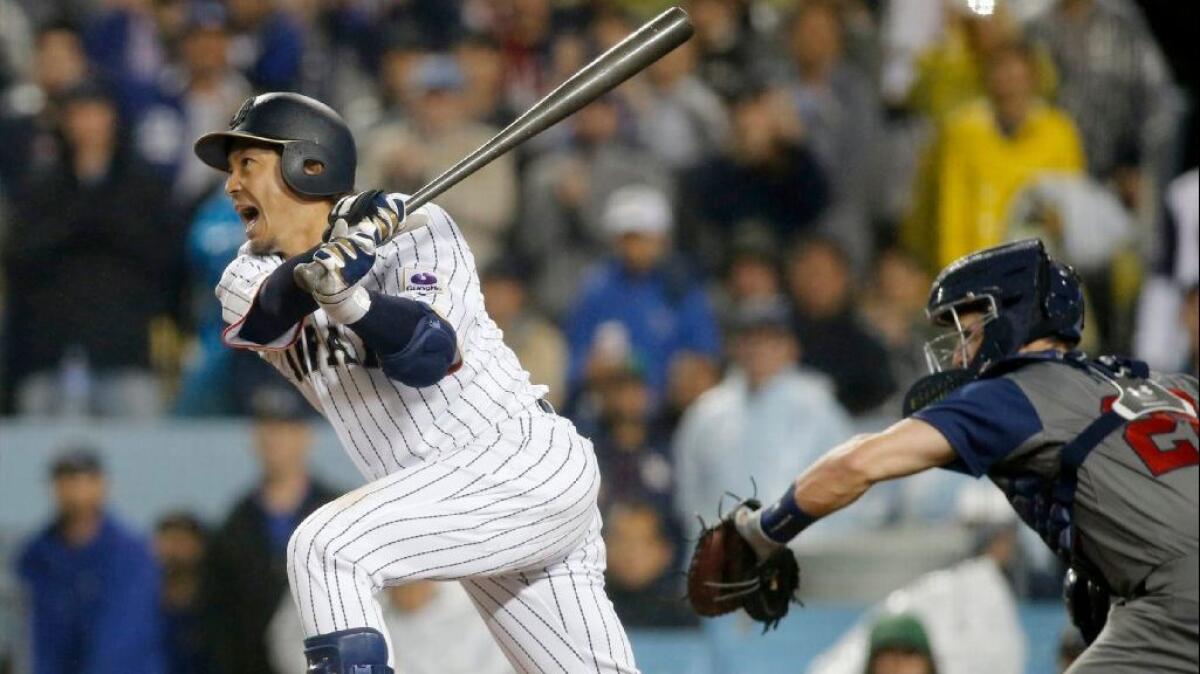World Baseball Classic keeps sport relevant in Japan

- Share via
The United States was the designated road team in the World Baseball Classic semifinal game played Tuesday night at Dodger Stadium, which was about right.
The primary soundtrack to the 2-1 victory by the U.S. over Japan was provided by a little orchestra stationed at the top of the left-field pavilion.
The nine-man band was armed with a drum, eight trumpets and a giant Japanese flag. The ensemble made its presence heard throughout the stadium in the bottom of every inning, loud and clear, leading individualized, horn-driven cheers for every hitter in the Samurai Japan lineup.
More than any other sport, baseball continues to move the people of Japan — in the case of this small-but-loud cheering section, literally. The group traveled from Japan specifically for this tournament.
“The team is our pride,” group leader Yoshihide Kubo said in Japanese.
The sport shouldn’t take this level of support for granted. In fact, the sport can’t take this level of support for granted.
Soccer is coming.
Some are calling for Major League Baseball to stop organizing the WBC, citing the lack of interest in the tournament in the United States. Rob Manfred has responded by saying he intends to continue backing the event, so long as he is commissioner.
Manfred views the tournament as a vehicle to increase baseball’s popularity globally.
The tournament’s real purpose might be something more humble: To prevent soccer from encroaching further into baseball’s traditional strongholds.
Soccer is making significant gains in countries such as South Korea, Cuba and Puerto Rico.
Japan, too.
Soccer’s popularity in Japan soared in the wake of the 1993 launch of the J-League, the country’s first professional league. The sport continued to build momentum throughout the decade. Japan qualified for its first World Cup in 1998 and started exporting players to top European leagues.
Soccer had momentum and started attracting a greater share of top athletes, as more and more children dreamed of becoming the next Hidetoshi Nakata instead of the next Ichiro Suzuki.
The WBC helped reverse the trend, or at least slow it down.
Japan won the inaugural WBC in 2006 as well as the second, which was held three years later. Suzuki was elevated to near-sainthood.
While soccer remains positioned to overtake baseball, no soccer team or soccer player has matched the success of the national baseball team on the international stage.
“With Japan winning the first two WBCs, the popularity of the tournament increased significantly,” Japan Manager Hiroki Kokubo said in Japanese. “The interest of the general population, not only baseball fans, increased.”
The players on the current team understand the implications their performance could have on future generations.
“Players know that if they perform well here, there will be children who say, ‘I want to be like that,’” Kokubo said. “The players are here to fight with that kind of purpose.”
Manfred was encouraged by what he saw when he visited South Korea and Japan in the earlier rounds.
“I will tell you, the level of excitement that I saw in both Korea and Japan for baseball, it’s hard to believe anything has overtaken baseball,” Manfred said.
Added Manfred: “One of the reasons that I went to Korea and went to Japan is I think it’s important to understand how the event is received on the ground in those countries. My personal experience convinces me that we really have something here that’s important to the growth of the game.”
Japan was completely engrossed in the WBC, with Samurai Japan’s games in the first couple of rounds appearing on close to 30% of television sets in the country. The tournament wasn’t only the top sports story in Japan, it was the only story.
Japan’s national soccer team has an important game this week, too, a World Cup qualifier against the United Arab Emirates. Japan has played in each of the last five World Cups, but is in real danger of not reaching the next tournament. One point separates the top four teams in Japan’s qualifying group; only the top two teams will automatically advance to the World Cup.
The upcoming soccer game has received minimal attention in Japan. That could be the WBC’s greatest triumph.
Follow Dylan Hernandez on Twitter @dylanohernandez
More to Read
Go beyond the scoreboard
Get the latest on L.A.'s teams in the daily Sports Report newsletter.
You may occasionally receive promotional content from the Los Angeles Times.











